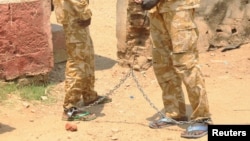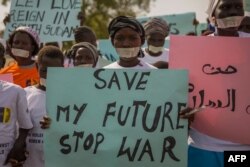U.N. investigators say they have identified more than 40 South Sudanese officials and military officers who may be responsible for war crimes and crimes against humanity.
The alleged crimes occurred during South Sudan's ongoing civil war, which has killed tens of thousands and uprooted more than 4 million people from their homes.
The report from the U.N. Commission on Human Rights in South Sudan, released Friday, details horrifying acts of cruelty against South Sudanese civilians. It says some victims had their eyes gouged out, their throats slit or they were castrated. Others were gang raped or forced to watch the rape of relatives.
The report makes the case for "individual command responsibility for widespread or systematic attacks on civilians."
The report also documents what commission member Andrew Clapham called "a clear pattern of ethnic persecution, for the most part by government forces who should be pursued for crimes against humanity."
The investigators say their findings are based on 230 witness statements and nearly 60,000 documents.
The civil war, which broke out in December 2013, is largely a conflict between ethnic Dinka supporters of President Salva Kiir and Nuer tribe rebels led by Kiir's former deputy Riek Machar. A 2015 peace agreement collapsed and a cease-fire agreement reached last year has had little impact.
The commission says a confidential list of 41 suspects has been forwarded to the U.N. High Commissioner for Human Rights, Zeid Ra'ad Al Hussein. The suspects include three state governors, 33 generals and five colonels.
No high-level South Sudanese officials have been prosecuted for crimes related to the civil war.
The U.N. commission is calling on the African Union to set up a promised special court to try alleged crimes.
"The court could be set up straight away and the prosecutor could begin working on indictments," said commission chief Yasmin Sooka. She noted that under the 2015 peace agreement, those indicted can no longer hold or run for office.







